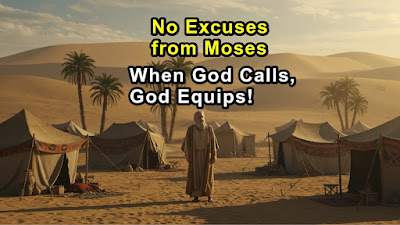"When God Calls, He Equips"
Text: Exodus 4:1–17
Have you ever felt inadequate for a task you knew was important—maybe something you believed God was asking you to do? Maybe you’ve had a sense of calling but felt overwhelmed by your weaknesses. If so, you are in good company. Moses, one of the most revered leaders in the Bible, experienced this same inner struggle in Exodus 4:1–17. Here, we see a conversation between God and Moses that reveals both human hesitation and divine patience.
The Excuses of Moses (Exodus 4:1, 10, 13)
God had already called Moses in Exodus 3, but here in chapter 4, Moses begins to push back. He gives three excuses:
-
"They won’t believe me" (v.1) – Moses feared rejection, doubting that the Israelites would believe that God had sent him.
-
"I’m not eloquent" (v.10) – Moses focused on his perceived weakness—his lack of speaking ability, whether due to a speech impediment or insecurity.
-
"Please send someone else" (v.13) – Ultimately, Moses just didn’t want to go. He doubted himself—and, indirectly, doubted God.
These excuses are not unfamiliar to us. We, too, fear rejection, feel underqualified, or just want someone else to do what God is asking of us.
The Signs God Gave (Exodus 4:2–9)
To assure Moses, God gives three miraculous signs:
-
The staff turns into a snake and back (vv.2–4) – Symbolizing God's power over nature and fear, and Moses' authority.
-
His hand becomes leprous and is healed (vv.6–7) – A sign of God's power to afflict and restore; a reminder that God controls even our bodies.
-
Water from the Nile turns to blood (v.9) – A powerful warning and sign of judgment, especially against Egypt's gods.
Each sign was not just for show but carried spiritual weight. These miracles were designed to affirm that the God of their ancestors was truly at work through Moses.
God’s Response to Moses' Insecurity (vv.11–12)
When Moses says he’s not a good speaker, God answers with a powerful question:
“Who gave human beings their mouths? Who makes them deaf or mute? ... Is it not I, the Lord?” (v.11)
In other words, “I know your limitations better than you do—and I’m still calling you.”
God promises, “I will help you speak and will teach you what to say” (v.12). What grace! But even then, Moses resists, and finally God becomes angry—not because Moses was weak, but because Moses was unwilling to trust.
Still, God doesn’t abandon him. Instead, He offers Aaron, Moses’ brother, to go with him and be his spokesman. God adapts to Moses’ weakness but doesn’t remove the call.
Lessons for Us
-
God knows our weaknesses—but still calls us.
He doesn’t wait for perfect people. He uses the willing, not just the qualified. -
God equips those He calls.
He provides signs, help, words, and people—whatever is needed to carry out His will. -
Excuses rob us of experiencing God’s power.
Fear is natural, but faith must respond. God is patient, but He expects obedience. -
God’s call is about His power, not our ability.
When we focus on our inadequacies, we forget the One who empowers us. God didn’t need Moses to be perfect—He needed him to trust.
Maybe you, like Moses, are wrestling with God’s call in your life. Maybe you feel too weak, too afraid, too imperfect. But God still says, “Go.” And He promises, “I will be with you.”
Don’t let fear stop you from following God’s purpose. Trust Him. Step forward in faith. Because when God calls, He doesn’t just send you—He goes with you. Amen!
More: EXODUS - Sabbath School Lesson 2 - The Burning Bush

No comments:
Post a Comment